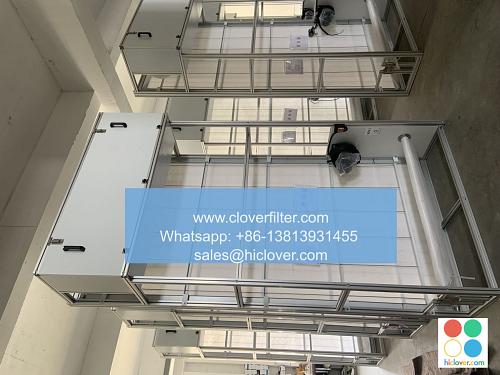Air Filter Regulations and Occupational Safety and Health Administration (OSHA) Compliance

The quality of indoor air is crucial for maintaining a healthy and safe working environment. Air filters play a vital role in removing pollutants and contaminants from the air, and their proper maintenance is essential for ensuring compliance with Occupational Safety and Health Administration (OSHA) regulations. In this article, we will delve into the world of Air Filter Regulations and explore their significance in various application areas, including industrial facilities, commercial buildings, and healthcare settings.
Importance of Air Filter Regulations
Air filter regulations are designed to protect workers from the hazards of airborne pollutants, which can cause a range of health problems, including respiratory diseases, allergies, and cancer. The OSHA sets standards for air quality and ventilation in the workplace, and employers must comply with these regulations to ensure a safe working environment. Air filter maintenance is a critical aspect of compliance, as it helps to prevent the buildup of harmful pollutants and ensures that the air is clean! and safe to breathe.
OSHA Compliance and Air Filter Regulations
To comply with OSHA regulations, employers must implement a comprehensive air quality management program that includes regular air filter maintenance, air quality monitoring, and employee training. The program should also include procedures for air filter replacement, air duct cleaning, and ventilation system maintenance. By following these guidelines, employers can ensure that their workplace meets OSHA standards for air quality and ventilation.
Application Areas for Air Filter Regulations
Air filter regulations apply to a wide range of application areas, including:
* Industrial facilities: Air filters are used to remove pollutants and contaminants from the air in industrial settings, such as manufacturing plants, warehouses, and construction sites.
* Commercial buildings: Air filters are used to maintain good indoor air quality in commercial buildings, such as office buildings, shopping centers, and hotels.
* Healthcare settings: Air filters are used to prevent the spread of infectious diseases and maintain a sterile environment in healthcare settings, such as hospitals, clinics, and laboratories.
Benefits of Air Filter Regulations
The benefits of air filter regulations are numerous and include:
* Improved indoor air quality: Air filters help to remove pollutants and contaminants from the air, improving the overall quality of the indoor environment.
* Reduced risk of respiratory diseases: By removing airborne pollutants, air filters can help to reduce the risk of respiratory diseases, such as asthma and chronic obstructive pulmonary disease (COPD).
* Increased productivity: A healthy and safe working environment can lead to increased productivity and improved employee morale.
Conclusion
In conclusion, air filter regulations are an essential aspect of maintaining a healthy and safe working environment. By complying with OSHA regulations and implementing a comprehensive air quality management program, employers can ensure that their workplace meets the highest standards for air quality and ventilation. Whether in industrial facilities, commercial buildings, or healthcare settings, air filters play a critical role in removing pollutants and contaminants from the air, and their proper maintenance is essential for ensuring a safe and healthy environment for employees.
It seems like you’re looking for a prompt to start a conversation or generate some text. Since you haven’t specified a particular topic or theme, I’ll offer a few general prompts across different categories. Feel free to pick the one that interests you the most or use them as inspiration to come up with your own:
-
Imaginary Story: You stumble upon a mysterious box in your attic. As you open it, you’re surprised to find a map, a compass, and a note that reads, “For the curious.” Where does this lead you, and what adventures unfold?
-
Future Technology: Imagine waking up one morning to find that technology has advanced to the point where robots and AI have surpassed human intelligence and capabilities. How would society change, and what would your role be in this new world?
-
Environmental Challenge: The world has just been alerted to a new, urgent environmental crisis that requires immediate action. Describe the crisis and the global response to it, including how individuals, organizations, and governments come together to address the issue.
-
Personal Growth: You’ve been given the opportunity to go back in time and give advice to your younger self. What would that advice be, and how would it change the course of your life?
-
Cultural Exchange: You’re invited to a cultural festival where different countries and communities come together to share their traditions, foods, and music. Describe your experiences at the festival, focusing on the interactions you have and what you learn about different cultures.
-
Science Fiction Scenario: Humanity has discovered a way to travel to parallel universes. Describe your first journey to a parallel universe, what you find there, and the implications of this discovery for our understanding of reality and the potential for inter-universal relations.
-
Historical Fiction: Imagine being a witness to a significant historical event. Choose an event and describe it from the perspective of someone who was there, including the emotions, sights, and sounds of the moment.
-
Philosophical Question: Explore the concept of identity and how it’s shaped by memory, experience, and interaction with the world. Consider the question, “What makes you, you?” and delve into the philosophical and psychological aspects of personal identity.
-
Utopian/Dystopian Society: Describe a future society that has achieved true utopia or has fallen into dystopia. Focus on the societal structures, laws, and cultural norms that define this world and how they impact the daily lives of its citizens.
-
Personal Achievement: You’ve just achieved a long-held dream or goal. Describe the journey to getting there, the challenges you overcame, and how achieving this goal changes your life and perspective.
Feel free to modify these prompts or use them as a starting point to explore your own ideas and interests!

